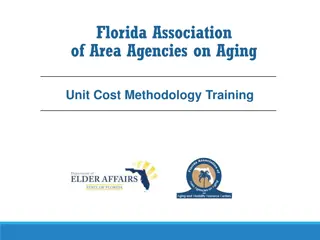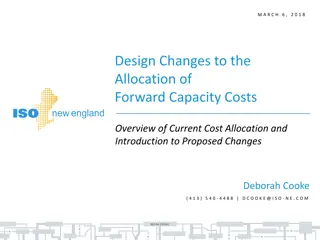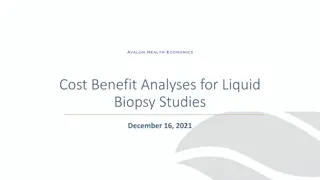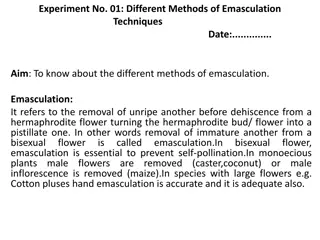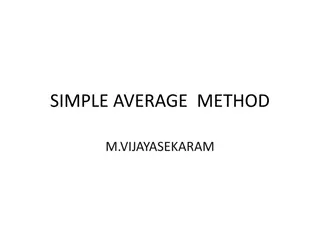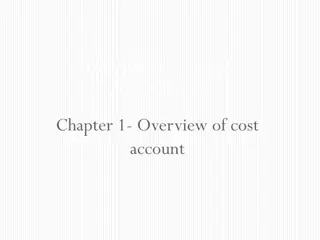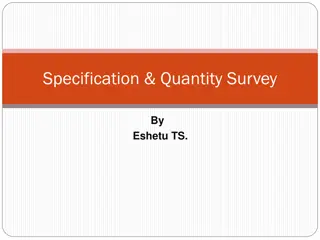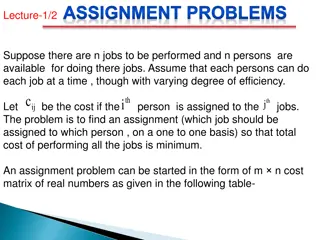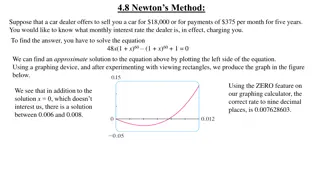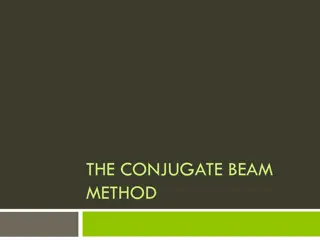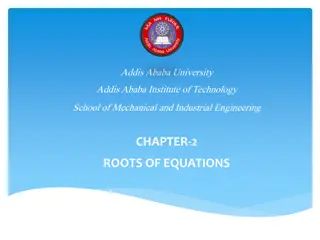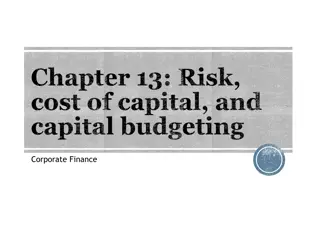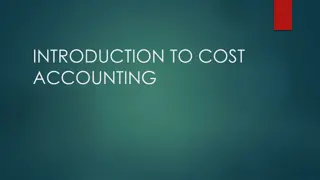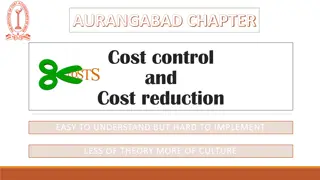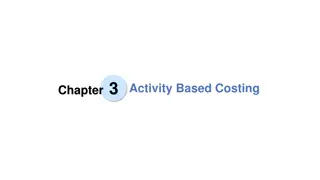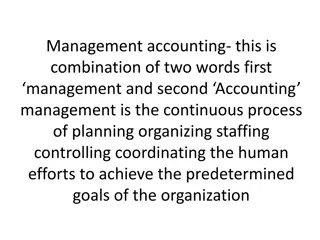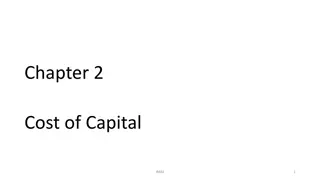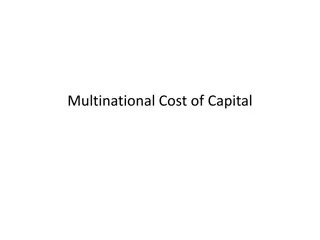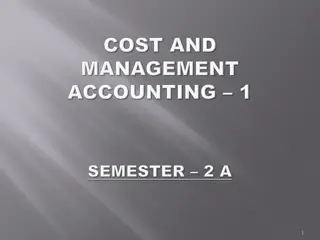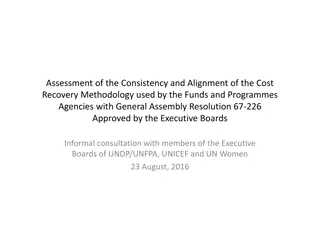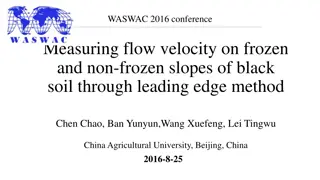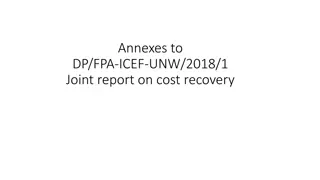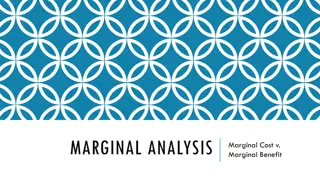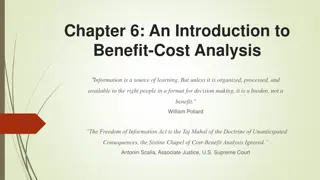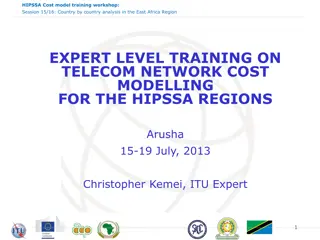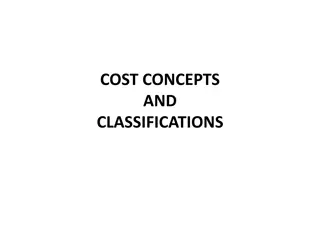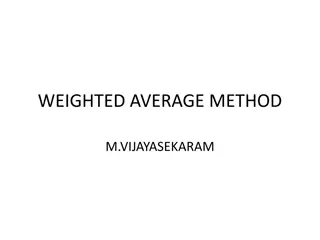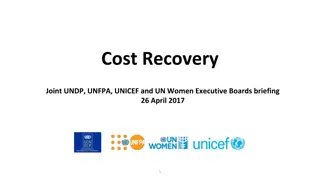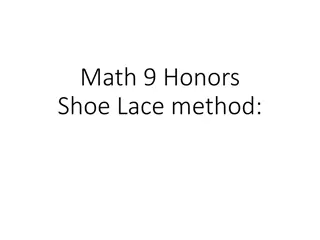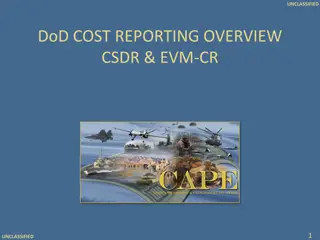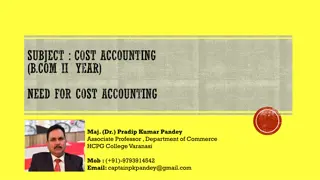Language Teaching Techniques: GTM, Direct Method & Audio-Lingual Method
Explore the Grammar-Translation Method, Direct Method, and Audio-Lingual Method in language teaching. Understand principles, objectives, and methodologies with insights into language learning approaches. Enhance teaching skills and foster effective communication in language education.
3 views • 82 slides
Cost Of Production
Explore the concepts of production cost analysis, focusing on total fixed costs, total variable costs, total cost of production, average cost, and average fixed cost. Learn how these costs behave in the short run and their impact on a firm's operations.
0 views • 26 slides
Understanding Unit Cost Methodology Training for Area Agencies on Aging
This training provides an overview of cost allocation principles and the Unit Cost Methodology (UCM) through video sessions and practical applications using UCM spreadsheets. It covers federal regulations, the operation of UCM, and the importance of cost allocation in federally funded programs. The
2 views • 33 slides
Proposed Changes to Forward Capacity Cost Allocation
The document discusses proposed changes to the allocation of forward capacity costs effective June 1, 2020. It highlights the need for transparency in cost allocation, focusing on zonal demand curves and the Marginal-Reliability Impact. The current opaque method is critiqued for potential non-intuit
0 views • 47 slides
Comprehensive Cost Management Training Objectives
This detailed training agenda outlines a comprehensive program focusing on cost management, including an overview of cost management importance, cost object definition, cost assignment, analysis, and reporting. It covers topics such as understanding cost models, cost allocations, various types of an
2 views • 41 slides
Cost-Benefit Analyses for Liquid Biopsy Studies: Understanding Health Economics and Decision Making
Health economics and decision making play a crucial role in evaluating the clinical utility and cost-effectiveness of liquid biopsies. Economic models such as cost-effectiveness analyses help in determining the incremental cost-effectiveness ratio (ICER) of interventions. Studies have shown varying
0 views • 23 slides
Understanding Different Emasculation Techniques in Plant Breeding
Learn about the significance of emasculation in plant breeding to prevent self-pollination and facilitate controlled pollination. Explore various methods such as hand emasculation, forced open method, clipping method, emasculation with hot/cold water, alcohol, suction method, chemical emasculation,
2 views • 10 slides
Academic Senate Resolutions and Low-Cost Thresholds in Higher Education
The Academic Senate addresses the adoption of open educational resources (OER) and low-cost materials to support academic freedom and compliance with legislative requirements. The resolution discusses the definition of low-cost resources and the variability among California Community Colleges in set
2 views • 9 slides
Simple Average Method in Cost Accounting
Simple Average Method, introduced by M. Vijayasekaram, is a technique used for inventory valuation and delivery cost calculation. It involves calculating the average unit cost by multiplying the total unit costs with the number of receiving instances. This method simplifies calculations and reduces
2 views • 5 slides
Understanding Cost Accounting Essentials
This overview delves into topics such as financial accounting, classification of accounts, cost ascertainment, and management accounting. It covers the meaning of cost, methods and techniques of costing, advantages and limitations of cost accounting systems, and essentials for a robust cost accounti
4 views • 27 slides
Project Cost Estimation: Methods and Factors
Project cost estimation involves valuing all monetary aspects necessary for planning, implementing, and monitoring a project. This includes various entrants such as preliminary investigation costs, design fees, construction expenses, and more. The purpose of cost estimation is to determine work volu
1 views • 44 slides
Hungarian Method for Solving Assignment Problems
The Hungarian method is a computational procedure used to minimize the total cost of assigning n jobs to n persons with varying efficiencies. It involves modifying the cost matrix, searching for optimal assignments, and iteratively improving the solution until an optimal assignment is found. The met
2 views • 15 slides
Understanding Newton's Method for Solving Equations
Newton's Method, also known as the Newton-Raphson method, is a powerful tool for approximating roots of equations. By iteratively improving initial guesses using tangent lines, this method converges towards accurate solutions. This method plays a crucial role in modern calculators and computers for
0 views • 12 slides
Understanding the Conjugate Beam Method in Structural Analysis
The Conjugate Beam Method is a powerful technique in structural engineering, derived from moment-area theorems and statical procedures. By applying an equivalent load magnitude to the beam, the method allows for the analysis of deflections and rotations in a more straightforward manner. This article
1 views • 11 slides
Understanding Roots of Equations in Engineering: Methods and Techniques
Roots of equations are values of x where f(x) = 0. This chapter explores various techniques to find roots, such as graphical methods, bisection method, false position method, fixed-point iteration, Newton-Raphson method, and secant method. Graphical techniques provide rough estimates, while numerica
0 views • 13 slides
Understanding Risk, Cost of Capital, and Capital Budgeting in Corporate Finance
Explore the concepts of risk, cost of capital, and capital budgeting in corporate finance, including the Capital Asset Pricing Model (CAPM), cost of equity, beta estimation, and cost of capital. Learn how to reduce the cost of capital and understand the impact of reducing the Weighted Average Cost o
0 views • 20 slides
Understanding Cost Accounting Fundamentals
Cost accounting involves determining the expenses incurred for producing goods or services, providing crucial information for decision-making, planning, and control. It aims to classify, record, allocate expenses accurately, presenting data for effective management guidance. Through cost classificat
0 views • 7 slides
Cost Control and Cost Reduction Strategies in Business: Understanding Implementation Challenges
Understanding the concepts of cost control and cost reduction is crucial for businesses, but implementing them can be challenging. This chapter explores the influencing factors for success in cost control and reduction, emphasizing the importance of cultural aspects, leadership, and management appro
1 views • 15 slides
Understanding Activity-Based Costing (ABC) in Cost Management
Activity-Based Costing (ABC) is a strategic costing method that allocates overhead costs to products based on activities. It offers benefits such as accurate cost allocation and identifying cost drivers but also has challenges due to increased complexity and customization. ABC differs from tradition
1 views • 15 slides
Understanding Management Accounting and Cost Accounting
Management accounting involves planning, organizing, and controlling human efforts to achieve organizational goals, while cost accounting focuses on determining the cost of products and services. The objective of cost accounting includes cost analysis, reduction, and decision-making support.
0 views • 33 slides
Determination of Dipole Moment in Chemistry
The determination of dipole moment in chemistry involves methods such as the Temperature Method (Vapour Density Method) and Refractivity Method. These methods rely on measuring various parameters like dielectric constants and polarizations at different temperatures to calculate the dipole moment of
1 views • 15 slides
Understanding the Cost of Capital in Finance
The cost of capital is crucial for businesses to determine the average cost of their finance. The Weighted Average Cost of Capital (WACC) is used as a discount rate in financial calculations. It involves estimating the cost of each source of finance and calculating a weighted average. Additionally,
0 views • 14 slides
Understanding Multinational Cost of Capital
Multinational corporations determine their cost of capital based on the cost of debt and equity. The cost of debt includes the interest rate and credit risk premium, while the cost of equity reflects the risk premium investors demand. Estimating an MNC's cost of capital involves assessing these comp
0 views • 24 slides
Understanding Cost Accounting: Techniques and Processes
Cost accounting is a specialized branch of accounting that involves the accumulation, assignment, and control of costs. It encompasses techniques like ascertainment of costs, estimation of costs, and cost control to aid in decision-making. Cost accounting plays a crucial role in budgeting, standard
2 views • 11 slides
Factors Affecting the Amount of Depreciation in Asset Valuation
Depreciation in asset valuation depends on the cost, estimated useful life, and probable salvage value. The cost of an asset includes various expenses incurred to put it in working condition. Estimated net residual value is the expected sale value of the asset at the end of its useful life after ded
2 views • 5 slides
Assessment of Cost Recovery Methodology Alignment with General Assembly Resolution 67-226
This report assesses the consistency and alignment of the cost recovery methodology used by UNDP/UNFPA, UNICEF, and UN Women with General Assembly Resolution 67-226. Issues such as declining core funding, the need to avoid cross-subsidization, and the importance of full cost recovery are highlighted
0 views • 14 slides
Veterinary Prescription Cost Calculations
Learn how to calculate the cost of veterinary prescriptions based on total dosage, drug strength, and unit cost. Two scenarios are provided with detailed calculations for determining the total cost of the prescription. Understand how to convert units, calculate total dosage required, determine the n
0 views • 11 slides
Measurement of Flow Velocity on Frozen and Non-Frozen Slopes of Black Soil Using Leading Edge Method
This study presented a detailed methodology for measuring flow velocity on frozen and non-frozen slopes of black soil, focusing on the Leading Edge method. The significance of shallow water flow velocity in soil erosion processes was emphasized. Various methods for measuring flow velocity were compa
0 views • 23 slides
Report on Effective Cost Recovery Rates by UNDP for 2014-2017
The joint report on cost recovery by UNDP for the years 2014-2017 provides detailed evidence and analysis of the effective average cost recovery rates, compliance with cost recovery policy, and calculations based on financial information. The report highlights contributions from various sources, inc
1 views • 23 slides
Introduction to Industrial Costing: Understanding Cost Types and Accounting Systems
Explore the fundamentals of industrial costing, including different cost types and accounting systems such as actual cost accounting, normal cost accounting, and standard cost accounting. Learn about cost data control, tasks of cost accounting, and the integration of cost type accounting in cost and
1 views • 24 slides
Understanding Marginal Analysis in Economic Decision-Making
Marginal analysis involves comparing Marginal Benefit with Marginal Cost to determine the optimal quantity for an activity. If Marginal Benefit is greater than Marginal Cost, there is a Net Marginal Benefit; if it's less, there's a Net Marginal Cost. The principle helps weigh costs and benefits befo
0 views • 14 slides
Overview of Benefit-Cost Analysis in Policy Decision Making
This chapter delves into benefit-cost analysis as an essential tool in policy evaluation. It outlines the steps involved in conducting a benefit-cost analysis, emphasizes the significance of defining and quantifying policy problems, and highlights the importance of identifying the seriousness of soc
0 views • 40 slides
Analyzing Telecom Network Cost in East Africa
This expert-level training workshop conducted in Arusha in 2013 delved into the country-by-country analysis of telecom network cost modeling in the East Africa region. The workshop covered topics such as regulatory frameworks, transparency, skills and resources, cost accounting, depreciation methods
0 views • 44 slides
Understanding Cost Concepts and Classifications for Effective Management
Explore the definition of cost, various cost classifications, elements of cost, and the preparation of cost sheets for managerial use. Delve into fixed and variable costs with examples from manufacturing jeans, highlighting the importance of managing costs in organizational operations.
1 views • 92 slides
Managing Summer Cost Share for Faculty with 9-Month Appointments
Explore the process of setting up and monitoring summer cost share for faculty with 9-month appointments. Learn why cost share for summer may not display on the FEC, how GCA establishes cost share using the Cost Share Module, and how departments should adjust the FEC to reflect summer cost share acc
0 views • 15 slides
Understanding Weighted Average Cost Method in Accounting
The weighted average cost method is a crucial approach in valuing inventory for businesses. It calculates the average cost of all inventory items based on individual costs and quantities held in stock. By dividing the cost of goods available for sale by the number of units available, this method det
0 views • 5 slides
Joint UNDP, UNFPA, UNICEF, UN Women Executive Boards Cost Recovery Briefing
Briefing on cost recovery for the joint Executive Boards of UNDP, UNFPA, UNICEF, and UN Women, covering topics such as feedback on cost recovery, role of core resources, cost recovery models using a LEGO approach, harmonization efforts, guidance for Executive Boards, and next steps towards proposing
0 views • 42 slides
Understanding the Shoe Lace Method for Finding Polygon Areas
The Shoe Lace Method is a mathematical process used to determine the area of any polygon by employing coordinate geometry. By following specific steps, including organizing coordinates, multiplying diagonally, and adding columns in a certain manner, the method allows for a straightforward calculatio
0 views • 8 slides
Defense Cost Reporting and Systems Overview
Defense Cost Analysis and Reporting Systems (CSDR) provide the cost community with essential data for developing independent cost estimates within major defense acquisition programs. The Defense Automated Cost Information Management System (DACIMS) offers instant access to historical cost informatio
0 views • 19 slides
Importance of Cost Accounting in Business Management
Cost accounting plays a crucial role in modern business environments where cost effectiveness and quality consciousness are vital for success. This branch of accounting helps in planning, controlling, and determining the costs of products or services, providing essential data for efficient managemen
0 views • 6 slides


